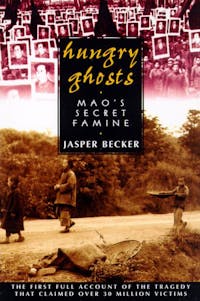Hungry Ghosts
Mao's Secret Famine
 Download image
Download image
ISBN10: 0805056688
ISBN13: 9780805056686
Trade Paperback
416 Pages
$26.99
CA$37.99
In the late 1950s and early 1960s, the Chinese people suffered what may have been the worst famine in history. Over thirty million perished in a grain shortage brought on not by flood, drought, or infestation, but by the insanely irresponsible dictates of Chairman Mao Ze-dong's "Great Leap Forward," an attempt at utopian engineering gone horribly wrong.
Journalist Jasper Becker conducted hundreds of interviews and spent years immersed in painstaking detective work to produce Hungry Ghosts, the first full account of this dark chapter in Chinese history. In this horrific story of state-sponsored terror, cannibalism, torture, and murder, China's communist leadership boasted of record harvests and actually increased grain exports, while refusing imports and international assistance. With China's reclamation of Hong Kong now a fait accompli, removing the historical blinders is more timely than ever. As reviewer Richard Bernstein wrote in the New York Times, "Mr. Becker's remarkable book . . . strikes a heavy blow against willed ignorance of what took place."
Reviews
Praise for Hungry Ghosts
"An accessible, masterly account of the greatest peacetime disaster of this century."—The New York Times Book Review
"Many claim that death has resulted from every attempt to communize agriculture and perhaps on the largest scale during China's disastrous 'Great Leap Forward.' But no one knows how many starved to death there in the years 1958-62—demographers place the lower limit at 30 million. The Communist government seemingly concealed the catastrophe from the outside world, abetted by the few Western visitors to the country (such as France's Mitterand), who declared there was no famine. Becker, a veteran East Asia correspondent for British publications, reconstructs the terrible event using interviews of survivors, whose ordeal he details in graphic chapters, describing hunger and cannibalism. According to Becker, unlike most famines in Chinese history, Mao's political famine beset the entire country, which induced opposition to the leader's fanaticism from more realistic leaders such as Liu Shao-ch'i and Teng Hsiao-p'ing, with whom Mao later settled scores in the Cultural Revolution. A subject still officially muted in China, the famine as Becker has investigated it becomes a less obscure chapter in the country's Communist history."—Booklist
"The first serious attempt to unearth the truth of the massive human tragedy behind the 'Great Leap Forward' in China between 1958 and 1961. Becker, Beijing bureau chief for the South China Morning Post, conducted hundreds of interviews in his effort to understand what happened. It is an extraordinary story, in which the errors that led Stalin to devastate agriculture in the Soviet Union, killing 11 million peasants, were duplicated in China by Mao, at the cost of another 30 million lives. Mao believed that wheat could be planted so close together that you could sit on it, furrows could be plowed 10 feet deep, and gigantic dams and canals built without expert advice. The plants died, the dams filled up with silt, and the canals were useless, but Mao was told that the national grain harvest had gone from 185 to 430 million tons. The officials now began to seize grain based on the inflated claims. When the minister of defense, Peng Dehuai, questioned the figures, he was put under house arrest and a campaign of terror instituted. The result, Becker notes, was bizarre because most of the party leadership knew the truth but couldn't acknowledge the widespread starvation until Mao did so. By the end of 1960 Mao's colleagues realized that the regime was in danger of collapse. Becker believes that the Cultural Revolution, launched by Mao in 1966, may well have been directed at undermining those who had striven to restore sanity. One of the most tragic aspects of this story is the role played by respected Western observers including Edgar Snow, Gunnar Myrdal, and Fran‡ois Mitterand. In ridiculing reports that China was suffering from famine, they may well have cost millions of lives. They also created a myth of what China had achieved, the consequences of which are still being felt in places like Cambodia, Ethiopia, and Tanzania a generation later. A remarkable book, the more devastating for its quietness and absence of rhetoric."—Kirkus Reviews



